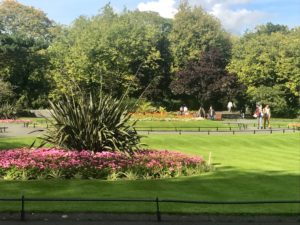It’s a dirty trick: the Church’s putting the Magnificat at evening prayer. It’s an examination of conscience thinly disguised as praise. An examination of conscience that is more a birthing of God in the soul, a raising of the soul to the perception of the divine around me. It’s a dirty trick because the evening isn’t when I want to be making God bigger by shrinking the divine into my heart and being.
I want God to leave me alone, to come back in the morning with encouragement and summoning so I can get up and make the walk in the misty cold to the church to join in the Rosary, to let the hurried rhythms of men and women whose devotional prayer doesn’t quite
fit into the time allotted for it—a prayer that takes nearly as long as the daily Mass that follows—fill me with repeated words about God being with Mary and filling her with grace. The mist stings my face and opens my pores. Ireland at that time of day seems bent on impregnating the spirit with the that of God, the particularity of holiness. It’s God’s smallness-bigness. God’s with me personally, but so too you. So too everyone.
But in the evening, God’s smallness-bigness isn’t what I want to be thinking about. I want to curl up with Proust and let his wordiness drown out the pulsating silence at the core of myself. At the strike of five, for reasons that have escaped me, I still pray the Liturgy of the Hours. I see the little red book sitting there and I think, “It won’t hurt per se,” despite my knowing that prayer is often a slap in the face. The Irish have a tendency to refer to people without naming them as “himself” or “herself.” If I don’t pray, I feel God saying, in a joking way, “And where is himself tonight?” (God has an Irish accent, of course.) Himself, I should think, is trying to figure out why his right hand doesn’t play that one chord progression correctly in a hymn that’s looming over his life. The call to prayer interrupts my brooding. How dare it?
The Magnificat tells about the creation God is continuously bringing about. Readers of this blog know well what it says. In my context here in Clonard in Wexford Town in the Diocese of Ferns in County Wexford in Leinster in the Republic of Ireland in Europe on Earth, God is creating deeply daily. There are relationships years old that flower into brightness amidst the weather’s near-constant grayness. And in that way the Irish do so well, those relationships have a sort of abhorring-a-vacuum tendency. They step in and ask the right questions, assuring that “Ah sure, you sang beautifully, hon.” Tea in
the morning after Mass is a sacrosanct time of companionship and love, the stuff of the sacred, coupled with off-color remarks about whatever and slagging, the stuff of the profane. Monsignor Denis Lennon, the parish priest here in Clonard, always says that “the sacred and the social should never be separated.” Communion is a meal of sacrificial love writ in earth-shaking terms and the tea that follows is a breaking of Digestive biscuits for the same reason: a faith that unites in trial needs some sweetness to fill its depths. So too does praying fill the mind with thoughts of the greater things, waking the heart from malaise. How dare it?
The poet and theologian Pádraig Ó Tuama, who engaged me in a much-needed Facebook message chat at the beginning of my time here in Ireland, often speaks of a phrase about trust from West Kerry, “Mo sheasamh ort lá na choise tinne.” Which he translates as “You are the place where I stand on the day when my feet are sore.” Amidst the overwhelming nature of being in a country not my own, my feet are starting to find that they’re resting on the comfortable love of a community that Gets It. God sometimes seems a shaky foundation to rest one’s feet on. The divine feels slippery sometimes: elusive, distant, cold, or worse, busy. God’s busy all right: busy not waiting for my ranting and raving to stop, rudely bursting in when I’ve reached pointless concern for minutiae. I’ve started to get the sneaking suspicion that it is not my prayer magnifying God at all, but God who is magnifying me. I don’t shrink God; God enlarges me. My human smallness is very, very small, but in the community I’ve entered in Wexford, the love is bigger than smallness, laying waste to whatever could get me down. How dare it?
So I’ll keep praying evening prayer every night, let it interrupt my brooding. Why? God dares and, thankfully, God magnifies.



